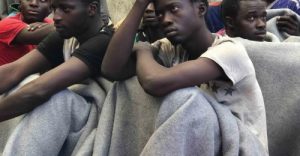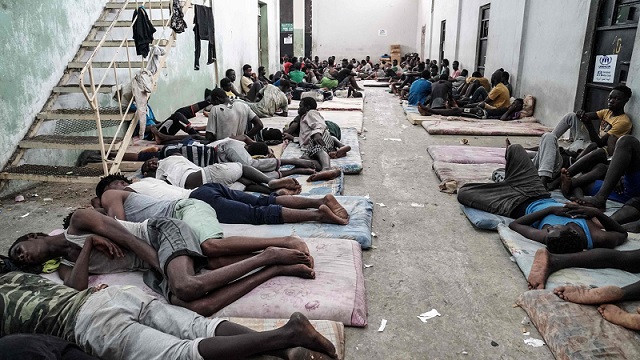KAMPALA- Rwanda has offered to provide refuge to as many as 30,000 African migrants suffering abuse and slave-like conditions in Libya. Foreign Minister Louise Mushikiwabo, who made the announcement on Nov. 22, said the figure “is not confirmed yet but an estimate”.
“It has just been decided so numbers and means are still under discussion but Rwanda estimates the number to be welcomed around 30,000,” she said.
Mushikiwabo told AFP that, “Rwanda, like the rest of the world, was horrified by the images of the tragedy currently unfolding in Libya, where African men, women and children who were on the road to exile, have been held and turned into slaves.”
“Given Rwanda’s political philosophy and our own history, we cannot remain silent when human beings are being mistreated and auctioned off like cattle,” she said referring to the 1994 genocide in which around 800,000 mostly Tutsi people were killed while the outside world looked on.
Rwanda is a tiny country with a population of nearly 12 million and Mushikiwabo acknowledged that it “may not be able to welcome everyone”.
But she added: “But our door is wide open”.
Rwanda’s offer has since been praised.
Mushikiwabo had earlier tweeted: “For Africans being sold in Libya: Rwanda is small, but we will find some space!”
Rwanda’s offer follows the release of CNN footage of a live auction in Libya where black youths are presented to North African buyers as potential farmhands and sold off.
CNN’s Nima Elbagir, Alex Platt, and Raja Razek traveled to Libya in October after obtaining footage of a migrant auction.

At a property outside the capital of Tripoli, CNN witnessed a dozen men being sold like commodities — some auctioned off for as little as $400.
CNN was told of auctions at nine locations across Libya, but many more are believed to take place each month.
CNN believes some of the auction sites are in territory controlled by the internationally recognized Libyan Government of National Accord (GNA), but others are not; the GNA does not control the entire country.
Libyan authorities have since launched a formal investigation into the slave auctions, according to Anes Alazabi, an official with the internationally recognised Libyan government’s Anti-Illegal Immigration Agency.
“Priorities of the investigation are not only to convict those responsible for these inhumane acts, but also to identify the location of those who have been sold in order to bring them to safety and return them to their countries of origin.”
The International Organization for Migration, an intergovernmental organization based in Geneva that focuses on migration management, welcomed the investigation.
But its chief of mission for Libya, Othman Belbeisi, warned in an interview with CNN’s Elbagir “that the smuggling networks are becoming stronger, more organised and better equipped.”
For years, migrants crossing the Mediterranean have brought with them stories of beatings, kidnapping and enslavement.
Many make harrowing journeys from West African countries. Those migrants who do make it to Europe are often too terrified to go on the record about their ordeal.
CNN has also provided the evidence of slave auctions in Libya by unscrupulous smugglers to the Office of the Prosecutor at the International Criminal Court.
African migrants, mostly from the west and Horn of Africa make the dangerous journey to Libya with hopes of making it across the Mediterranean Sea to Europe.
Testimony collected by AFP in recent years has revealed a litany of rights abuses at the hands of gangmasters, human traffickers and the Libyan security forces, while many end up stuck in the unstable north African nation for years.
More than 8,800 stranded migrants have been returned home this year, according to the International Organization for Migration, which is also amassing evidence of slavery.
African outrage
The African Union (AU) added its voice to the outrage that greeted footage last week of African migrants being auctioned at a “slave market” in Libya, and on Tuesday AU Commission chairman Moussa Faki Mahamat called on African countries to help.
“I appeal to all member states of the African Union, the African private sector and African citizens to make financial contributions to help alleviate the suffering of African migrants in Libya,” Faki said on Nov.21.
“I urge member states that have logistical means to make them available to facilitate the evacuation of African migrants who wish to leave Libya.”
The AU Commission chairman and other World leaders may have been quick to voice outrage over the video footage of Libyan slave auctions, but activists raised the alarm months ago — and their warnings fell on deaf ears.
Aid workers, rights groups and analysts say they had been shouting about rape, torture, and forced work for thousands of black Africans in the war-torn north African country until they were blue in the face.
But it took CNN’s footage of young Africans being auctioned off near Tripoli, filmed on a hidden camera and aired on November 14, to force Western and African leaders into a flurry of condemnation.
United Nations chief Antonio Guterres was “horrified”.
France requested an urgent meeting of the UN Security Council, with President Emmanuel Macron branding the auctions a crime against humanity.
But NGOs and experts have charged leaders with hypocrisy.
“Ordinary people aside, everyone knew about this — governments, international organisations, political leaders,” said Hamidou Anne, a Senegalese analyst at think-tank L’Afrique des Idees.
Alioune Tine, Amnesty International’s West Africa director, said “hostage-takings, violence, torture and rape” were well documented in Libya.
“And we’ve been talking about slavery for a long time,” he added.
Libya became a massive transit hub for sub-Saharan Africans setting sail for Europe after the fall of dictator Muammar Gadhafi in 2011 tipped the country into chaos.
More than 1.5 million migrants have arrived in Europe since 2015, according to UN figures and the EU has been desperate to stem the influx. But leaders are at a loss to find solutions for the asylum seekers on the other side of the Mediterranean.
The EU has faced heavy criticism from the UN over its training of the Libyan coastguard, which the world body’s rights chief said resulted in migrants being sent back to “horrific” prisons.
`Unimaginable horrors’
With EU support, Italy has been training Libyan coastguards to intercept boats as part of a controversial deal that has seen migrant arrivals down nearly 70 percent since July.
But the UN charges that the policy leaves migrants returned to Libya at risk of torture, rape,
forced labour, and extortion.
“The international community cannot continue to turn a blind eye to the unimaginable horrors endured by migrants in Libya,” UN rights chief Zeid Ra’ad Al Hussein said.
Brussels has hit back that its coastguard training has helped save lives — nearly 3,000 people have died trying to cross the Mediterranean this year — while EU aid has helped UN agencies to send 10,000 migrants home from Libya voluntarily.
In The Gambia, Karamo Keita set up a group to warn fellow youngsters not to attempt the trip to Europe, after suffering horrific abuses in Libya including slave labour.
“In Libya, black people have no right,” he told AFP back in September.
“We were taken to various farms where the Libyan guy sold us as slaves. We worked on the farms for free.”
The International Organisation for Migration had in April reported the existence of markets where migrants became “commodities to be bought”.
And several months later the head of medical charity Medecins Sans Frontieres, Joanne Liu, wrote an open letter to European governments warning of the thriving “kidnapping, torture and extortion business”.
“In their efforts to stem the influx, are European governments ready to pay the price for rape, torture and slavery?” she asked, adding: “We can’t say we didn’t know about this.”
‘Don’t condemn, act’
Amnesty’s Tine said that in its efforts to stop migrants arriving “at all cost”, Europe bore “a fundamental responsibility” for the horrors in Libya.
Yet others are also to blame, he told AFP.
“African countries do nothing to make their young people stay, to give them work,” he said.
Analyst Hamidou Anne also said a passive response from African leaders was in part to blame for the unfolding disaster, along with “systematic racism in the Maghreb countries”.
“This cannot go on,” he said.
“Faced with a crime against humanity you don’t condemn it, you act.”
Migration commissioner Dimitris Avramopoulos meanwhile told AFP on Nov.23 that the EU was “working without let-up” to find solutions.
Tine said slavery needed to be on the agenda at an EU-AU summit on November 29-30 in Abidjan, an idea already floated by Niger’s President Mahamadou Issoufou.
“We need an impartial investigation to see how the trafficking is organised and who is behind it,” Tine said.
And, he added, “everyone must take their responsibilities.”



